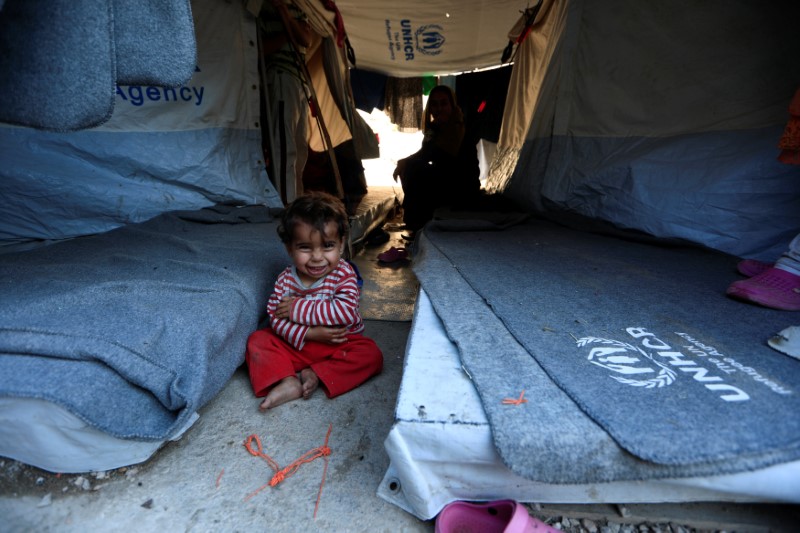
By Stephen Kalin
DEBAGA, Iraq (Reuters) – While fleeing Islamic State rule in northern Iraq three months ago, Laila saw two of her daughters die in front of her. Crippled by grief and the trauma of that night, she now struggles to walk and hardly eats.
Running under the cover of darkness after more than two years under the jihadists’ harsh rule in Shirqat town, south of Mosul, Laila’s children stepped on a mine. The youngest one died on the spot, covered in blood and partially buried in the dirt.
Her 16-year-old daughter had a leg blown off and lost consciousness. Laila tied the girl’s leg with her own headscarf, then carried her on her back for several kilometers to the Iraqi army’s frontline.
“I could hear her soul leaving her body, her head on my shoulder,” she recounted earlier this month at a nearby camp for internally displaced people (IDPs) where she now struggles with depression and post-traumatic stress disorder (PTSD).
The battle to retake Mosul, Islamic State’s last major stronghold in Iraq, is playing out among the city’s nearly 1.5 million residents who have spent 2-1/2 years under the ultra-hardline group’s repression.
The militants have employed extreme violence to impose their strict interpretation of Islamic law in territories they seized in 2014, whipping people for smoking, cutting off hands for stealing, stoning women for adultery, and throwing men off of buildings for homosexuality.
Several thousand civilians have been killed or wounded in the street-to-street fighting since the U.S.-backed offensive began in October.
Nearby camps are full of civilians displaced from in and around Mosul and many suffer from depression and anxiety disorders, aid groups say.
“I feel lost, my life has no meaning anymore,” said Laila. “If your car is stolen, you can buy another one. If your house is destroyed you can build another one. But a life cannot be replaced.”
She is taking psychotropic medication and attends weekly counseling sessions run by aid group Medecins Sans Frontieres (MSF), but she says nothing helps.
“Treatment cannot heal a heart in pain,” she said.
MASS TRAUMA
In a nearby tent at Debaga sits a young mother of three, from another village south of Mosul. She looks about twice her 20 years and speaks in a monotone, rarely making eye contact.
It was during their escape last autumn that she went into labor, giving birth to twins. The couple declined to go into details about the circumstances of the birth, but the woman has since been diagnosed with depression and PTSD.
A counselor says she has struck her husband and tried to kill one of her babies. She also has suicidal feelings but refuses medication.
“She is talking to you normally right now, but sometimes she chokes the baby and tells me, ‘I don’t want him, you take him’,” her husband said. Their names are withheld by Reuters to protect their safety.
Their flight is just one of a raft of deeply traumatic events suffered by their family in recent years, and by many others like them.
They had not yet fled their village when Islamic State fighters stormed their home, accusing the husband of sedition. A former policeman, he had worked with U.S. forces following the 2003 invasion.
The militants shot in the air around him, then put a machine gun to his head and dragged him off to a mosque where they beat him.
Another time, an air strike destroyed a neighbor’s house. Their dog picked through the rubble and dragged back human remains.
“There were parts left there, a hand or a leg,” the woman said. “The dog brought them to our front yard and chewed on them in front of our kids.”
LIMITED ACCESS TO MEDICATION
Pre-existing mental health conditions affecting IDPs have been exacerbated by limited access to medication under IS rule and the trauma of displacement.
Those still in Mosul have even fewer opportunities for treatment, as is the case for those affected by physical illness and the wounded.
A resident of Muharibeen district told Reuters last week that his mother fell into a coma more than a month ago when Islamic State fighters stormed their house.
He pleaded in vain for an ambulance to transport her to nearby Erbil, the capital of the relatively peaceful, autonomous Kurdish region, where hospitals treat those of Mosul’s wounded civilians who make it there. As of Friday, his mother was still at home in Mosul, and still unconscious.
Another local man said his five-year-old daughter, who has a brain defect due to premature birth, has been unable to obtain medicine for more than two years. She can barely speak.
Treatment of the displaced is hampered by the continued violence in Mosul.
“The rate of relapse is very high… because the IDPs on a daily basis receive painful news and stories,” said Bilal Budair, MSF’s mental health manager.
“So we treat and support them, but the bad news has an opposite effect and sets back some of the patients to zero.”
(Editing by Raissa Kasolowsky)







